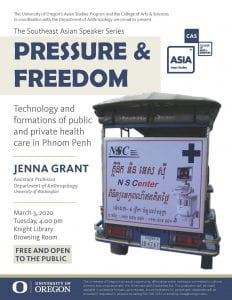Mar 3 – Public and Private Health Care in Phnom Penh
Pressure and freedom: Technology and formations of public and private health care in Phnom Penh
Jenna Grant, Assistant Professor Department of Anthropology, University of Washington
March 3, 2020 Tuesday, 4:00 pm Knight Library Browsing Room
 Free market and democracy talk were very much in the air in Cambodia of the early 2010s. On the Medical Imaging Ward, doctors and medical students explained the contemporary by means of a contrast: “Because now, we have a free market.” “Because now, we can choose.” They were signaling the logic and affect of dramatic changes in the organization of economy and society since the end of the socialist period (1989-). In this talk, I explore how medical imaging participates in the re-configuration of public and private health care in Phnom Penh. I consider different concepts to help parse the organization of care when Cambodia’s political economy evades captions such as “socialism” or “free market capitalism.” There is the “post-political”, there is the “neopatrimonial”, both useful but not exclusive in their description of the way care and value flow in public and private spheres. Diagnostic services are the first green shoots of private practice. They are an easy entry into the health care market because they do not require much capital, and labour costs are low. Staying close to material practices of buying, selling, regulating, scanning, and diagnosing, we can see how imaging technologies, particularly ultrasound, shape the health care field. Care is configured with other regimes of value, such as real estate and land, through logics of speculation, pressure, and what one public health researcher called, “freedom.”
Free market and democracy talk were very much in the air in Cambodia of the early 2010s. On the Medical Imaging Ward, doctors and medical students explained the contemporary by means of a contrast: “Because now, we have a free market.” “Because now, we can choose.” They were signaling the logic and affect of dramatic changes in the organization of economy and society since the end of the socialist period (1989-). In this talk, I explore how medical imaging participates in the re-configuration of public and private health care in Phnom Penh. I consider different concepts to help parse the organization of care when Cambodia’s political economy evades captions such as “socialism” or “free market capitalism.” There is the “post-political”, there is the “neopatrimonial”, both useful but not exclusive in their description of the way care and value flow in public and private spheres. Diagnostic services are the first green shoots of private practice. They are an easy entry into the health care market because they do not require much capital, and labour costs are low. Staying close to material practices of buying, selling, regulating, scanning, and diagnosing, we can see how imaging technologies, particularly ultrasound, shape the health care field. Care is configured with other regimes of value, such as real estate and land, through logics of speculation, pressure, and what one public health researcher called, “freedom.”
Sponsored by the University of Oregon’s Asian Studies Program and the College of Arts & Sciences in coordination with the Department of Anthropology